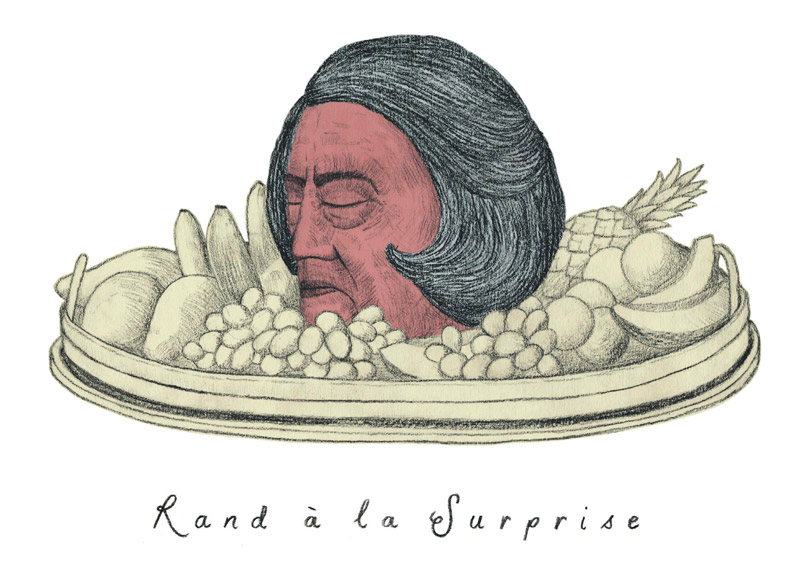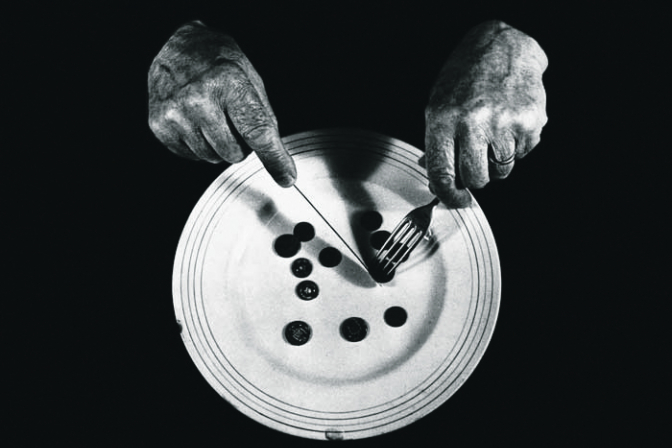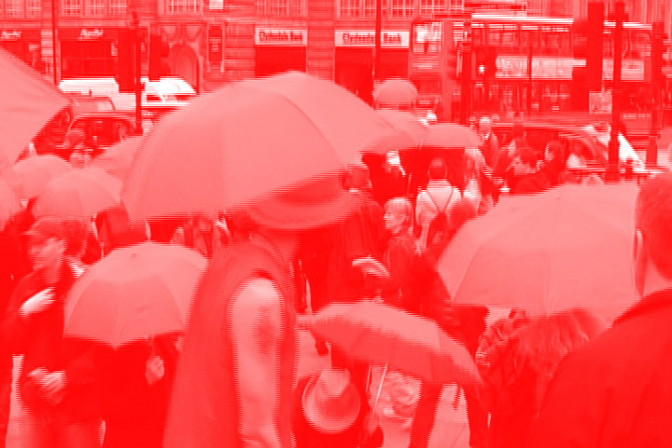Eat the Rich!: Wise-up and Rise‑up
In 1987 the opening scene of the film, Eat the Rich began in London’s fictitious upper-class restaurant ‘Bastards’. A flickering TV screen had been placed by one wall. On the screen the Home Secretary, played by Nosher Powell, was speaking:
Some people in this country are very very rich, but most of you are very very poor.
You know why?
It’s because you’re all lazy bastards
Eat the Rich was filmed a generation ago and yet the home secretary talked today's talk of strivers and shirkers. The film was a portent of a world to come. It told us what the extremists of the 1980s would bequeath us. Back then only a minority accepted what is now known as Randian fiction: the belief that most people are lazy bastards and just a few deserve to be rich. No Home Secretary, no government minister, could go on TV then and tell people that most of them were lazy.
In Eat the Rich the fictitious Home Secretary explains that as far as he is concerned almost all of his subjects are just not up to it. They are poor because they are lazy and the rich are rich because they have worked so hard for what they have. However, he offers the poor a chance. He tells them that if they work hard, really hard, they too have a chance to be rich. The only way in which people can know if they have worked hard enough is if they find themselves one day to be rich. And for those who are rich, it is only because they have worked hard that they are rich; or that their parents worked hard and will have passed on their hard-working genes to their offspring, who can only continue to be rich if they too work hard, and look after all that hard-won money.
What the rich have to fear is that one day the shirkers and skivers might wise-up and rise-up. If not literally eating the rich then, at the very least, consuming all their wealth and leaving the rich destitute. If all that matters to you is wealth, then losing all your wealth is as bad as being eaten alive.
Eat the Rich was a tale about Randian thinking because its main character was a follower of Ayn Rand. However, in 1987 hardly anyone knew who Ayn Rand was. Born in Russia in 1905, she spent most of her life in the USA, still over-reacting to her family losing their wealth in the revolution of 1917. She wrote the book Atlas Shrugged, about how she thought the world should be and why it wasn’t like that. Just before her death, in 1982, she saw Margaret Thatcher elected to power in the UK, and Ronald Reagan gain office in the USA.
Outside of Russia there had been a slow revolution throughout Rand’s lifetime and she hated it. Between 1917 and 1979 the poor ate the rich—or at least their wealth—as if it were food. They spread the resources, tore down the mighty houses, walked out of their jobs serving on tables and cleaning others' bedrooms. At the start of this process they came out of the chimneys they had swept as children. At the end they went to university. In between they had demanded and won decent wages for toiling on a factory floor.
By the 1970s mill owners were unable to continue living the high life. They could no longer make so much money out of their workers that they could guarantee luxury for their children. They could no longer promise that the children of ‘industrialists’ need to never work again but instead live off a Trust Fund. By the 1970s, all over Europe and in the USA, the poor and the middle classes had eaten most of the wealth of the rich. And the rich were not well pleased.
A few met and plotted, most famously in the USA where Rand held soirees with the likes of the future chair of the Federal Reserve, Alan Greenspan. Small groups of the very affluent (and the soon to be even more affluent) plotted how to make the world more unequal in future. They succeeded—or at least their plotting coincided with inequality rising. Darryl Cunningham's new book Supercrash: How to Hijack the Global Economy spells it out in cartoon form, so that we can teach young children what we have done to the world, and for them to learn how to fight a way through.
The economic crash of 2008 did nothing to reduce the enthusiasm of those who would like inequalities to rise and rise. In October 2013, journalist Dawn Foster managed to infiltrate the UK's second annual Ayn Rand lecture; in November 2014 she won the ‘new journalist of the year’ award for the quality of her coverage.
Dawn explained that the men at the Ayn Rand lecture were told that, because they mostly worked in finance and were rich: ‘By having decided to work for a living, instead of begging or stealing, you are already a source of pride…’ The 2013 speaker was a businessman who explained that he gets his employees to send 5000 letters a year to politicians, as if they were from each of them personally, in an attempt to influence politicians to vote and act in favour of his wealth.
Dawn went again, a year later, to hear yet another London lecture on how Rand’s philosophy will save the world from the shirkers and skivers who freeload. The speaker in November 2014 exhorted his audience of suited businessmen to believe that: ‘Inequality is good because it raises everybody up. It raises everybody up. Isn't that a beautiful thing?’ When questioned over the evidence that inequality rising makes everyone worse-off, the speaker replied: ‘Your life is the most important thing you have! Why should I live for anyone except me?’ Dawn called this ‘his asshole's charter’. The speaker went on: ‘There's no reason to live for anyone else…Any attempt to tinker with inequality is a crime’.
The 2014 UK annual Ayn Rand lecture continued: ‘What you should care about is you—not your neighbour. When I see a billionaire, I celebrate. What we have is a culture of envy. People saying, 'I hate him, he's a bastard…Altruism breeds envy, whereas capitalism is a philosophy of love and benevolence and success. Dawn noted that the men at the lecture found it hard to talk to each other. They were so selfish that engaging in a conversation where they could not be sure of a benefit to them was too hard for many of them. The rich are often not very able, but they are rapidly becoming richer.
Today the rich hold almost all of the world’s wealth, which amounts to some $263 trillion, according to the bank Credit Suisse and their Global Wealth Report for 2014. Should your wealth, net of any outstanding debts or loans, be the equivalent of $798,000, then you are in the top single percentage of the world’s wealthiest people. The group you are in accounts for just under half—48%—of all global assets. Last year that share stood at just over 41%. Should it continue to rise by 7% a year, then in just over seven years from now the best-off 1% on the planet will own everything. Everybody else will have nothing, at which point eating the rich stops being a joke.
The current madness is about to end. The land-grab of world wealth by the very wealthiest will slow down—if not stop, simply because mathematically it has to stop rising as fast as it is rising today. It is just not possible for those at the very top to continue to take more and more of the pie. What may replace our current madness will likely be a very similar madness, but it will feel very different from the last few decades where those at the top have taken more and more and more of a shrinking pie. World economic growth has been slowing since the 1950s.
The supporters of Ayn Rand, who have held sway for so long, now sound as out of touch as they have always been—but it is so much easier to see the madness after the crash. However, they have no way of knowing just how wrong they are. They believe governments not bankers caused the crash! Very few of them are as exposed to the public glare as much as Alan Greenspan was. He had to admit he was wrong or face ridicule. But most Randian financiers are part of a small group of people who find getting on with others very difficult. They will tell themselves (to the very last moment) that others are after their wealth and, in a sense, they are right—we are.
Bankers don't see a slowdown coming, at least not according to the reports they are willing to share with the rest of us. In their latest world wealth report Credit Suisse explained that by 2019, they expected global wealth in total to grow by 40%—in just five years, to reach $369 trillion. They predict that what they called ‘emerging markets’, which they say contributed 11% of total global wealth growth from 2000 to 2014, will—in just the next 5 years—account for 26% of the global wealth growth to come. In other words the rich of the world will continue to get much richer, but a growing proportion of their gains will come from profit that they make from people in some of the poorest places on earth.
This prediction leaves Credit Suisse suggesting that in the next five years, the number of dollar millionaires on the planet will have increased by half, from 35 million today to 53 million people by 2019. The Telegraph Newspaper, which reported these estimates without an ounce of skepticism in October 2014, had just three months earlier in the July, reported on government bond rates in Germany and France that had fallen to levels not seen since Genoa in the fifteenth century.
The last time the excessive feasting of the extremely rich came to an end, almost exactly a century ago, it did not end without violence, war, revolution, depression, hunger or catastrophe. Eventually the rich are always, metaphorically, eaten when they get too rich—but never cooked using the same recipe twice.

Get it here



